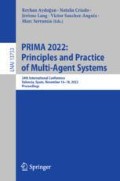Abstract
The action language m\(\mathcal {A}^*\) employs the notion of update models in defining transitions between states. Given an action occurrence and a state, the update model of the action occurrence is automatically constructed from the given state and the observability of agents. A main criticism of this approach is that it cannot deal with situations when agents’ have incorrect beliefs about the observability of other agents. The present paper addresses this shortcoming by defining a new semantics for m\(\mathcal {A}^*\). The new semantics addresses the aforementioned problem of m\(\mathcal {A}^*\) while maintaining the simplicity of its semantics; the new definitions continue to employ simple update models, with at most three events for all types of actions, which can be constructed given the action specification and independently from the state in which the action occurs.
Access this chapter
Tax calculation will be finalised at checkout
Purchases are for personal use only
References
Baltag, A., Moss, L.: Logics for epistemic programs. Synthese 139, 165–224 (2004)
Baltag, A., Moss, L., Solecki, S.: The logic of public announcements, common knowledge, and private suspicions. In: 7th TARK, pp. 43–56 (1998)
Baral, C., Gelfond, G., Pontelli, E., Son, T.C.: Reasoning about the beliefs of agents in multi-agent domains in the presence of state constraints: the action language mAL. In: Leite, J., Son, T.C., Torroni, P., van der Torre, L., Woltran, S. (eds.) CLIMA 2013. LNCS (LNAI), vol. 8143, pp. 290–306. Springer, Heidelberg (2013). https://doi.org/10.1007/978-3-642-40624-9_18
Baral, C., Gelfond, G., Pontelli, E., Son, T.C.: An action language for multi-agent domains. Artif. Intell. 302, 103601 (2022)
van Benthem, J., van Eijck, J., Kooi, B.P.: Logics of communication and change. Inf. Comput. 204(11), 1620–1662 (2006)
Bolander, T., Andersen, M.: Epistemic planning for single and multi-agent systems. J. Appl. Non-Classical Logics 21(1), 9–34 (2011)
Bolander, T.: Seeing is believing: formalising false-belief tasks in dynamic epistemic logic. In: van Ditmarsch, H., Sandu, G. (eds.) Jaakko Hintikka on Knowledge and Game-Theoretical Semantics. OCL, vol. 12, pp. 207–236. Springer, Cham (2018). https://doi.org/10.1007/978-3-319-62864-6_8
Buckingham, D., Kasenberg, D., Scheutz, M.: Simultaneous representation of knowledge and belief for epistemic planning with belief revision, pp. 172–181 (2020)
van Ditmarsch, H., van der Hoek, W., Kooi, B.: Dynamic Epistemic Logic, 1st edn. Springer, Heidelberg (2007). https://doi.org/10.1007/978-1-4020-5839-4
Fagin, R., Halpern, J., Moses, Y., Vardi, M.: Reasoning About Knowledge. MIT press, Cambridge (1995)
Löwe, B., Pacuit, E., Witzel, A.: DEL planning and some tractable cases. In: van Ditmarsch, H., Lang, J., Ju, S. (eds.) LORI 2011. LNCS (LNAI), vol. 6953, pp. 179–192. Springer, Heidelberg (2011). https://doi.org/10.1007/978-3-642-24130-7_13
Pham, L., Izmirlioglu, Y., Son, T.C., Pontelli, E.: A new semantics for the action language ma*. Technical report, NMSU (2022). https://github.com/phhuuloc/New-semantic-mAstar
Rajaratnam, D., Thielscher, M.: Representing and reasoning with event models for epistemic planning. In: Proceedings of the 18th International Conference on Principles of Knowledge Representation and Reasoning, pp. 519–528 (11 2021)
Acknowledgments
The authors have been partially supported by NSF grants 2151254, 1914635 and 1757207. Tran Cao Son was also partially supported by NSF grant 1812628.
Author information
Authors and Affiliations
Corresponding authors
Editor information
Editors and Affiliations
Rights and permissions
Copyright information
© 2023 The Author(s), under exclusive license to Springer Nature Switzerland AG
About this paper
Cite this paper
Pham, L., Izmirlioglu, Y., Son, T.C., Pontelli, E. (2023). A New Semantics for Action Language m\(\mathcal {A}^*\). In: Aydoğan, R., Criado, N., Lang, J., Sanchez-Anguix, V., Serramia, M. (eds) PRIMA 2022: Principles and Practice of Multi-Agent Systems. PRIMA 2022. Lecture Notes in Computer Science(), vol 13753. Springer, Cham. https://doi.org/10.1007/978-3-031-21203-1_33
Download citation
DOI: https://doi.org/10.1007/978-3-031-21203-1_33
Published:
Publisher Name: Springer, Cham
Print ISBN: 978-3-031-21202-4
Online ISBN: 978-3-031-21203-1
eBook Packages: Computer ScienceComputer Science (R0)

